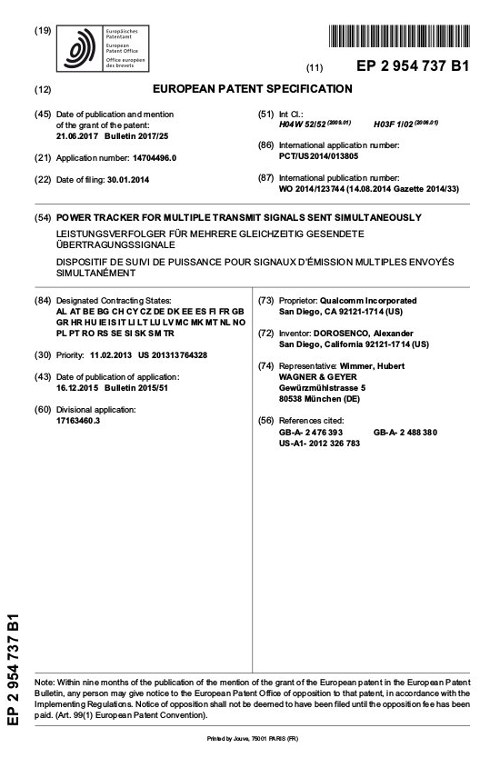

THE EPO and USPTO have both granted software patents to hardware giants which disguised these as "physical". We covered some examples earlier this year (including Qualcomm's, as above).
The name of the game is the claim. There's no German equivalent, at least none that rhymes, but I vividly remember Quinn Emanuel's Dr. Marcus Grosch stressing this point when he was defending Motorola Mobility against Microsoft, particularly in the Munich appeals court. Now, as counsel for Qualcomm in a German lawsuit against Apple that will be tried on Thursday and involves the iPhone's built-in Spotlight search technology, he's espousing the very opposite position. The former anti-software-patent campaigner in me dreads and hates the notion of software patents being given overbroad scope in litigation--way beyond any reaonable claim construction.
Whatever may come out of that Munich case (technically, a host of cases asserting different members of the same patent family and targeting different Apple entities) is rather unlikely to move the needle in the intercontinental Qualcomm v. Apple dispute. Based on how a first hearing held went in May, even an infringement finding wouldn't result in an immediate injunction: the case(s) would most likely be stayed over validity concerns. But Munich is one of Europe's most important--and fastest--patent litigation venues, and Presiding Judge Dr. Matthias Zigann one of Europe's influential patent judges (among other things, he's a contributor to a leading reference on patent law). An infringement holding could set a dangerous precedent affecting many other cases before the Spotlight matter, if ever (since the patents-in-suit might all die anyway), would be appealed.
[...]
The word "only" is key here. Qualcomm's counsel says: if a user only has usable communication channels (suzch as only one usable channel per user) in an address book, the search result will be limited to only usable communication channels. Unfortunately, there's no Markman proceeding in Germany, where claim construction would be determined first and where disputed claim limitations would have to be interpreted by the court in writing. Otherwise I have no doubt--no doubt whatsoever--that this claim element here would have been deemed a filter (a word that, therefore, appeared multiple times in my May post on this matter).
"When large companies leverage patents in such lawsuits they know that it would be too costly (and time-consuming) to challenge all underlying patents."We're sadly seeing -- again and again -- how Qualcomm and the likes it frame software as "hardware" or "physical". Quality (lack thereof) is disguised by quantity. Müller said: "It wouldn't be practical to have one or more courts make this determination for thousands of patents. And a motion for partial summary judgment is subject to rather strict page limits--the whole idea of summary judgment is that you raise an issue that the court can easily decide. Apple and the likes of Foxconn therefore picked three exemplary patents (from the ones Apple and the contract manufacturers tackled before)."
When large companies leverage patents in such lawsuits they know that it would be too costly (and time-consuming) to challenge all underlying patents. Examiners must remember that. Don't give them 'ammo' so easily. ⬆